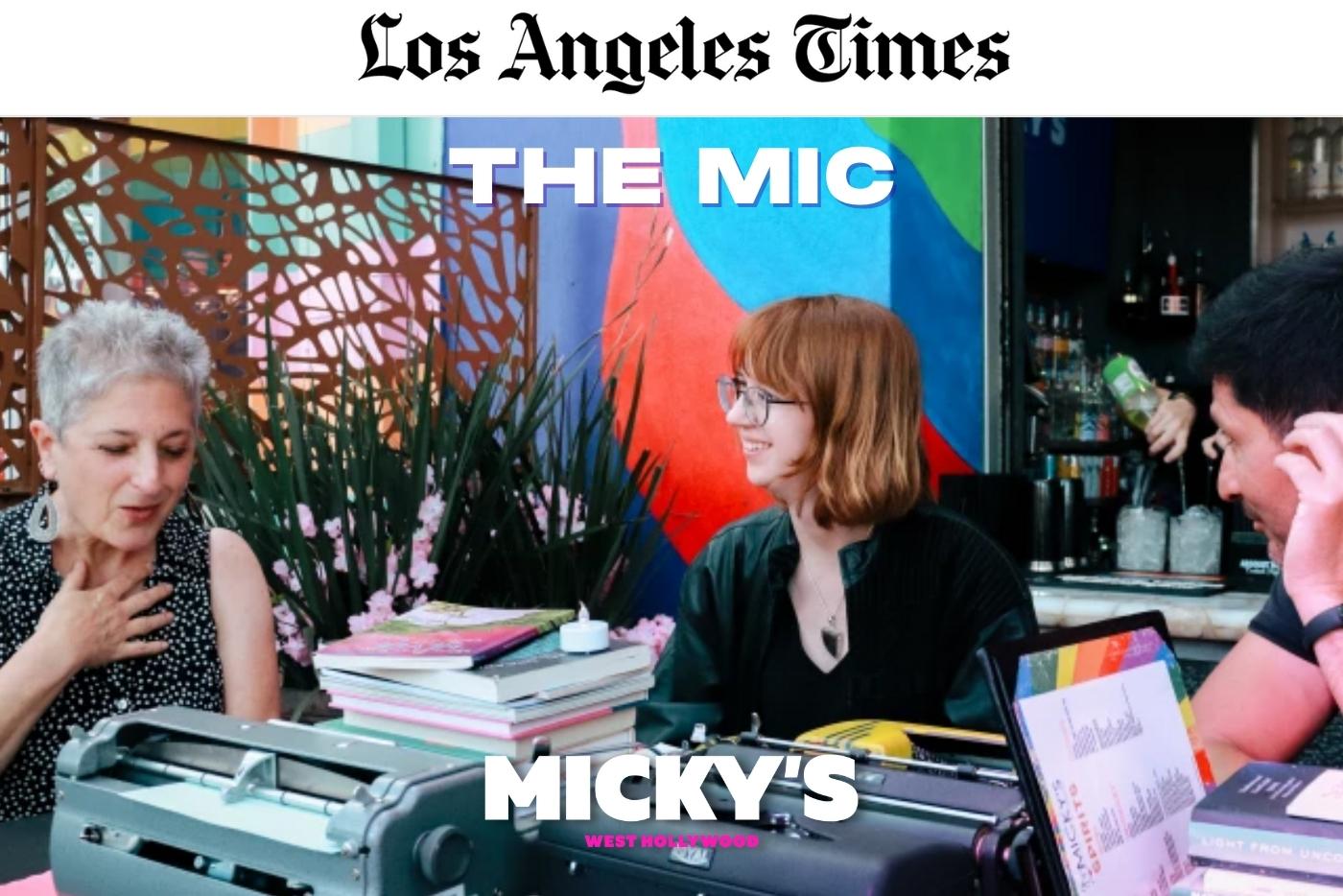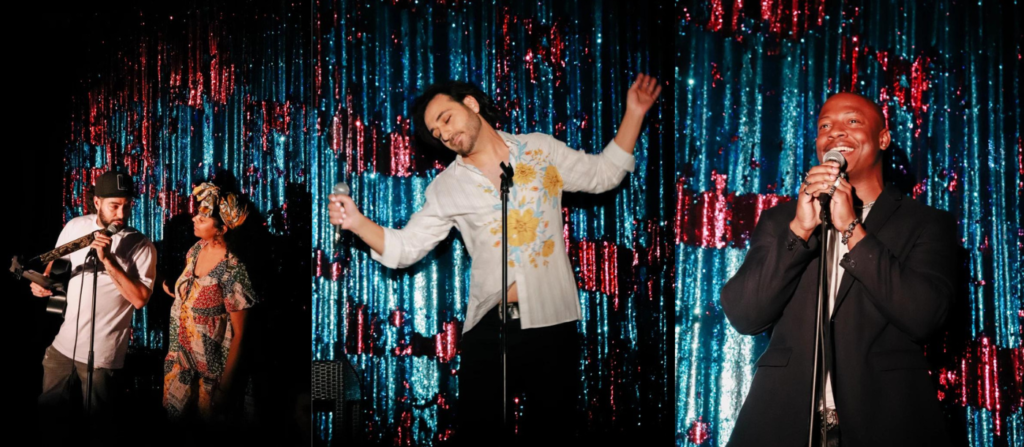

West Hollywood is known as the Los Angeles epicenter of the LGBTQ community. During Pride Month, every gay bar and club in WeHo, as it’s colloquially known, is filled to the brim with partygoers dancing to blasting music as go-go dancers strip for tips. Among the liveliest venues is Micky’s, a two-story nightclub hosting drag shows and DJs, and this year’s Pride felt much the same there as in prepandemic years — except for a new event last Tuesday evening featuring a fresh form of queer expression: a gay open-mic night.
“The Mic,” a new poetry-rooted performance series that launched in March, has found an unexpected home at Micky’s, and a time slot — 7 to 9 p.m. — that serves a preclubbing crowd.

Gay bars and clubs are among the few establishments that offer queer people the chance to socialize without fear of exclusion or worse. So it’s fitting that the organizers are reimagining what Micky’s can provide beyond partying, in this case, by offering a live event that doesn’t require you to be wasted to enjoy the show.
For regulars at Micky’s, seeing the bar in daylight can be disorienting, but also invigorating. Winter Jonz, a singer and songwriter at last week’s launch, certainly felt that way as artists congregated downstairs, snacking on tacos before “The Mic” kicked off. “I am able to connect to my community and let them see me,” Jonz said, “and not just always from the club scene where I’m inebriated in a corner, swaying to Katy Perry.”
On the second floor of Micky’s, performers were brightly lighted against a vibrant curtain conveniently adjacent to the bar. For Brian Sonia-Wallace, a co-host of “The Mic” and currently the poet laureate of West Hollywood, the vibe was meant to foster friendships rather than the quick flirtations and flings of club nights.
“This is where I learned how to be unapologetic about who I am,” said Sonia-Wallace. “And these are my people, not because I’m drinking; these are my people because this is the space to be unapologetic. Maybe you find someone cute at ‘The Mic,’ but also it really is a space to hear each other’s stories and to just listen in a nonjudgmental way.”
“The Mic” at Micky’s was put on pause for a number of weeks between the months of April and May as organizers worked out logistics; its relaunch at the beginning of June brought Pride festivities to the forefront. Poets, singers and comedians performed, some dressed in rainbow colors, all wearing their own pride loudly before an encouraging and engaged audience — including some newcomers to Micky’s.
Ronna Magy, a lesbian writer in her 70s, came to support a fellow writer; she was enthusiastic about “The Mic,” but she hadn’t frequented the venue before.
Magy remembered a time in the ‘90s when lesbian bars in Los Angeles were thriving. As these bars disappeared, she felt the loss of institutions where women would gather socially, romantically and intergenerationally. She was grateful for an open mic that might fill that void.
“I love that people are all different generations, and we’re just all writers,” Magy said of “The Mic.” “[It] brings people together in an emotive way, you know, that crosses generations and crosses time.”
Tony Moore, a “Mic” co-host who emcees many local drag shows and live events, is known locally as the voice of West Hollywood. His infectious laughter leavened the transitions between performers, some of whom shared visceral stories about joy and grief. These included anecdotes about sex or undergoing medical transitions or, for example, unwanted advances on the job as a stripper. Even in intimate, hesitant moments, as when a singer shied from the mic, claps and cheers filled the awkward pauses, and the show went on.
Many of the acts moved the audience in unanticipated ways. The night closed aptly with an audience singalong appropriate to the theme of forging emotional intimacy among strangers: an acoustic rendition of “Just Friends”:
“I’m not trying to pressure you / Just can’t stop thinkin’ ‘bout you / You ain’t even really gotta be my girlfriend / I just wanna know your name.”
Nate Lovell, the third co-host of “the Mic,” said the series emerged in response to a clear need from the local LGBTQ community. In the past, at more general open mics around the city, Lovell has changed the pronouns of a lover from “him” to “her” in his poems in order to assimilate with a less queer-affirming audience.
Beyond that, he was looking to create a space where pain could be shared without judgment or shame.
“As gay people, there’s a wealth of emotion,” Lovell said. “Pain doesn’t alienate us, it serves to bring us together. I think too many people are in pain and alone.”
Across L.A. County’s LGBTQ scene, West Hollywood still holds a reputation for predominantly attracting a specific crowd — white, male and affluent. Lovell jokes that among the three hosts, he’s the “prince” of West Hollywood, answering the call for Black queer voices to be centered in the city. After working across most of the gay bars in the neighborhood, he said Micky’s sets itself apart by drawing the most diverse and inclusive crowd; it’s where “The Mic” belongs.
The hosts have insisted on the weekly event being open to the public and free to attend. Tony Velovski, the manager at Micky’s, said it isn’t necessarily the smartest business decision, but it’s the right one for their community — and especially its most underrepresented members.
“It’s a labor of love, but it’s not really a moneymaker,” said Velovski, adding that even when factoring in the added drinks revenue, the event won’t break even. “I am talking about using it as a venue for truly unheard voices more deeply affected by institutional racism.”
Velovski is planning for “The Mic” to run weekly on Tuesdays and steadily expand, with more small presses involved and lowered barriers for underrepresented writers. He sees “The Mic” as a way of amplifying artists and promoting positive images of nightlife beyond the tourist attractions of debaucherous entertainment.
Others who don’t identify as LGBTQ came to “The Mic” as allies and to support and celebrate fellow artists. One of them, poet Nayeli Knudsen, has seen spaces like “The Mic” emerge from the pandemic and collective turmoil of the last years, as a pent-up craving for human connection bursts out from the bubbles of work-from-home isolation into physical space — complicating the story of a city often associated with loneliness.
“Where you wouldn’t necessarily go out to something like this before, there’s now that urgency,” Knudsen said. “The atmosphere was palpable and you could feel the emotions of people connecting … in ways that felt rejuvenating and inspiring and just wonderful.”
As “The Mic” wrapped the relaunch of its Micky’s residency, Lovell asked everyone in the room to place hands on one another in quiet reflection. And as if on cue, the music downstairs turned up and pulsating beats broke the intimate silence, signaling the start of another night of revelry. The dancers were headed inside, the artists — for the moment — having said their piece.
